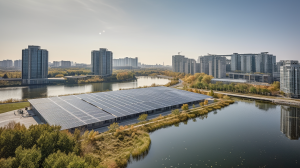Introduction to Energy Efficiency and a Sustainable Future
The concept of energy efficiency is intrinsically linked to the pursuit of a sustainable future, contributing significantly to our efforts to reduce carbon footprints, cut energy consumption, and limit greenhouse gas emissions. At its core, energy efficiency involves the optimization of energy usage, often through energy-efficient home construction, retrofitting or upgrading of appliances, and other targeted interventions in both homes and workplaces. The success of these ventures relies primarily on energy systems that are designed to utilize less energy without sacrificing comfort or functionality. Key features often include the incorporation of renewable energy sources such as solar energy through solar panels, insulation to regulate heating and cooling costs, energy-efficient appliances bearing the Energy Star label, and, of course, behaviors committed to reducing energy waste.
In our pursuit of creating a sustainable future, it’s critical to recognize the role of the U.S. Department of Energy, the International Energy Agency, and similar organizations that regulate energy consumption through energy conservation mandates, research, and the development of building codes that encourage the use of energy-efficient materials. By conducting regular energy audits, we can identify leaks in the energy performance of a building and make necessary upgrades that result in lower energy bills and long-term cost savings. Furthermore, the transition to LED or compact fluorescent lights from traditional incandescent bulbs can significantly reduce a home’s energy use and save money in the process, making them an attractive choice for homeowners. The quest for greater energy efficiency and a greener world also involves a key focus on sustainable building construction and implementing energy-saving technologies.
Sustainable building and energy-efficient construction techniques utilize features like improved insulation in the roof and walls to regulate heating and cooling. Renewable energy systems, especially when integrated with existing building technologies, can boost energy savings and reduce dependence on fossil fuels. Optimizing home energy efficiency also requires looking beyond big-ticket items to focus on areas often overlooked–– reducing the energy consumption of daily-use appliances and practices that inadvertently contribute to energy waste. In essence, the sustainable future we envision draws heavily on the core principle of energy efficiency and conscious decisions that help save energy, while also promoting economic benefits and comfort.
Understanding Energy Consumption and the Importance of Building Energy
 Understanding energy consumption, especially within the context of buildings, illuminates the criticality of investing in energy-efficient strategies and technologies.
Understanding energy consumption, especially within the context of buildings, illuminates the criticality of investing in energy-efficient strategies and technologies.
According to the Building Technologies Office, buildings account for a significant amount of the primary energy consumption globally.
This triggers a realization that operating spaces such as homes, offices, and commercial buildings take a lot of energy, particularly when it comes to home heating and cooling costs. For example, a significant part of energy costs often goes toward maintaining heating and cooling systems, further underpinning the need for energy-efficient upgrades with less heat waste. Additionally, individual actions such as setting the temperature of these devices help to optimize energy usage, proving to be a testament to the power each person holds in the bid to reduce energy consumption.
The benefits of reducing energy consumption extend beyond the boundaries of financial concerns and delve into environmental and intrinsic aspects. Indeed, implementing sustainable practices such as insulating your home increases the energy efficiency and comfort in your living spaces. Chosen strategies can range from small actions—like turning off unused lights—to significant structural changes, such as energy-saving green building technologies, that maximize energy savings. Here are some ways to improve the energy efficiency of your building:
- Insulating your home properly can help reduce the heating or air conditioning costs.
- Selecting energy-efficient appliances, which can save energy and money.
- Regularly servicing your heating and cooling systems, so they remain efficient.
- Incorporating sustainable practices like utilizing natural light and ventilation to cool your home.
These efforts in new homes and renovations not only reduce your energy consumption but also reduce our carbon footprint—an immensely necessary practice in today’s eco-conscious world. Moreover, these strategies aren’t limited to homes, but can also be used in commercial and public buildings, further reducing energy waste on a broader scale. Indeed, comprehending energy consumption and investing in energy efficiency is crucial for our individual pockets, our collective environment, and our shared future.
The Power of Renewable Energy for a Sustainable Future
 The quest for a sustainable future stands on the significant pillar of renewable energy, a powerful force that has the potential to transform our environmental footprint. Utilizing renewable energy is one of the best ways to ensure an energy-efficient future, not only helping us tread the path of ecological balance but also enabling us to save energy and money.
The quest for a sustainable future stands on the significant pillar of renewable energy, a powerful force that has the potential to transform our environmental footprint. Utilizing renewable energy is one of the best ways to ensure an energy-efficient future, not only helping us tread the path of ecological balance but also enabling us to save energy and money.
The widespread adoption of renewable energy sources, like solar, wind, and hydropower, aids in drastically reducing energy consumption, thereby providing us with cost-effective strategies for living. In our homes, the effective harnessing of renewable energy can be revolutionary. It has the unique capacity to cool your home in the summer and heat it during the winter, considerably cutting down heating costs and ultimately reducing home energy use.
Contrary to conventional sources, homes’ use of renewable energies presents a reliable and eco-friendly solution based on the amount of available natural resources. In addition to offering a promising method to reduce our carbon footprint, the integration of renewable energy in our daily routines can create a long-lasting impact on our collective journey towards sustainable living.
Economic Benefits of Implementing Energy-Efficient Strategies
Implementing energy-efficient strategies presents significant economic benefits to various sectors of the economy, ranging from industrial enterprises to private households. Energy-efficient methods aid in achieving more while utilizing less energy and consequently, minimizing operational costs. These strategies extend not only to the use of energy-efficient appliances but also to the optimization of industrial processes and the design of eco-friendly buildings. By investing in energy-efficient technologies, businesses can achieve financial savings that come from reduced energy expenses while enhancing their environmental performance.
Energy-efficient practices are critical for the development of a sustainable economy as they play a significant role in reducing overall energy consumption. Effective energy management often leads to:
- Lowered utility bills
- Reduced maintenance costs
- Increased asset value
- Improved indoor air quality
- Enhanced comfort of occupants
From a broader perspective, energy efficiency stimulates job creation, enhances energy security, and fosters economic resilience by reducing the reliance on fossil fuel imports. Thus, the adoption of energy-efficient strategies presents multifold economic advantages, contributing to both immediate cost savings and long-term financial sustainability. Moreover, it helps in curbing greenhouse gas emissions, and aligning economic growth with environmental conservation.
By reducing the energy demand, these strategies alleviate pressure on energy grids, thereby decreasing the likelihood of power outages and stabilizing energy prices. In essence, energy efficiency serves as a crucial pillar in the journey towards a more resilient and sustainable economic landscape, proving beneficial for businesses, consumers, and the environment alike.
Conclusion
In summary, transitioning to energy-efficient appliances and systems is a critical step in our global effort to conserve resources and mitigate climate change. By embracing energy-efficient technologies, we not only promote sustainable living but also significantly invest in the economic health of our world. Energy-efficient devices or practices not only last longer and perform better but also provide improved productivity and are less costly in the long run. Furthermore, this approach helps reduce energy consumption, leading to lower greenhouse gas emissions contributing to global warming. In essence, adopting energy-efficient strategies is beneficial for several reasons. It promotes eco-friendliness, combats the rising environmental threats, and most importantly, saves money for consumers and businesses alike.
Therefore, it is vitally important that we shift our focus toward energy efficiency for the betterment of our planet and future generations. By doing so, we will make a significant stride towards achieving environmental sustainability. This transition to more efficient forms of energy use is not only a responsibility but also an opportunity to make the world a better place. It represents an important strategy for tackling the challenges faced by our planet, fostering social well-being, and ensuring a prosperous future.
FAQ’s:
Q1. What is energy efficiency and how does it help reduce energy consumption?
A1. Energy efficiency is the practice of using less energy to achieve the same or better results. It helps reduce energy consumption by using less energy to do the same tasks, thus reducing the amount of energy needed to power homes and businesses.
Q2. What are some strategies for energy savings in the home?
A2. Strategies for energy savings in the home include using energy-efficient appliances, installing energy-efficient windows and doors, and using energy-efficient lighting. Additionally, using renewable energy sources such as solar and wind can help reduce energy consumption.
Q3. What are the benefits of energy efficiency?
A3. The benefits of energy efficiency include lower energy bills, improved comfort, and a reduced environmental impact. Additionally, energy-efficient homes can help reduce energy consumption and help protect the environment.
Q4. How can I make my home more energy efficient?
A4. Making your home more energy-efficient can be done by using energy-efficient appliances, installing energy-efficient windows and doors, and using energy-efficient lighting. Additionally, using renewable energy sources such as solar and wind can help reduce energy consumption.
Q5. What are the best energy-efficient appliances?
A5. The best energy-efficient appliances include refrigerators, dishwashers, washing machines, and dryers. Additionally, LED light bulbs and Energy Star-certified appliances are also great options for energy efficiency.
Q6. How can I reduce my energy consumption?
A6. Reducing energy consumption can be done by using energy-efficient appliances, installing energy-efficient windows and doors, and using energy-efficient lighting. Additionally, using renewable energy sources such as solar and wind can help reduce energy consumption.
Q7. What are the benefits of using renewable energy sources?
A7. The benefits of using renewable energy sources include lower energy bills, improved comfort, and reduced environmental impact. Additionally, renewable energy sources can help reduce energy consumption and help protect the environment.

Sanela Isakov
Sanela is a passionate advocate for environmentally conscious living. With a background in environmental science, she brings a wealth of knowledge to our community, inspiring readers to make sustainable choices in their daily lives. Join Sanela on a journey toward a greener, more sustainable future.


 Energize Your Eco-Home: A Comprehensive Guide to Energy Efficiency
Energize Your Eco-Home: A Comprehensive Guide to Energy Efficiency
